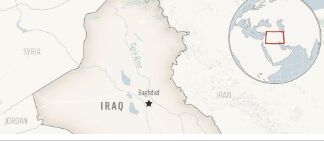Tensions Escalate in Kirkuk: Clashes, Death Toll Rise Amidst Disputed Police Headquarters Handover
Tensions rise in Kirkuk as clashes leave four dead. The country's top court halts handover of police headquarters to Kurdish Democratic Party, exacerbating existing tensions among Kurds, Arabs, and Turkmen.
Tensions rise in the disputed city of Kirkuk in northern Iraq as clashes leave a death toll of four, according to medical officials. The country's top court has issued an order halting the planned handover of the Iraqi federal police headquarters in Kirkuk to the Kurdish Democratic Party, exacerbating the existing tensions in the city which is home to a mixed population of Kurds, Arabs, and Turkmen.
Moments being shot dead by Iraqi police during today’s protests in Kirkuk, this Kurdish man said “Kirkuk belongs to Kurdistan.”
— Karwan Faidhi Dri (@KarwanFaidhiDri) September 2, 2023
pic.twitter.com/8hLYYM7Tkn
The conflict in Kirkuk dates back to October 2017 when federal forces seized the city and its surrounding oil fields after Kurdish regional authorities organized a referendum for Kurdish independence. As part of the agreement to form the current government, Prime Minister Mohammed Shia al-Sudani included a provision for the return of the Kurdish Democratic Party to the province. However, this decision has faced backlash from some communities in Kirkuk. Last week, a group of local Arab residents closed the Kirkuk-to-Erbil highway in protest over the re-opening of the Kurdish Democratic Party headquarters.
The situation escalated on Saturday when Kurdish protesters demanded the reopening of the highway, resulting in clashes with security forces. In response to the unrest, the prime minister ordered the postponement of the Kurdish Democratic Party headquarters' reopening. Furthermore, the Iraqi Federal Supreme Court issued a ruling to halt the handover of the police headquarters to the party until a related lawsuit is resolved.
Prime Minister Sudani reiterated his orders to authorities during a cabinet meeting on Sunday, calling for a thorough investigation into the circumstances surrounding the deaths of the protesters. He emphasized the need to hold all those responsible accountable in accordance with the law. These developments highlight the ongoing tensions and complexities in Kirkuk, as various communities vie for control and influence in the disputed region. The situation remains volatile, and it is essential for the government to address the grievances of all communities and work towards a peaceful resolution.




